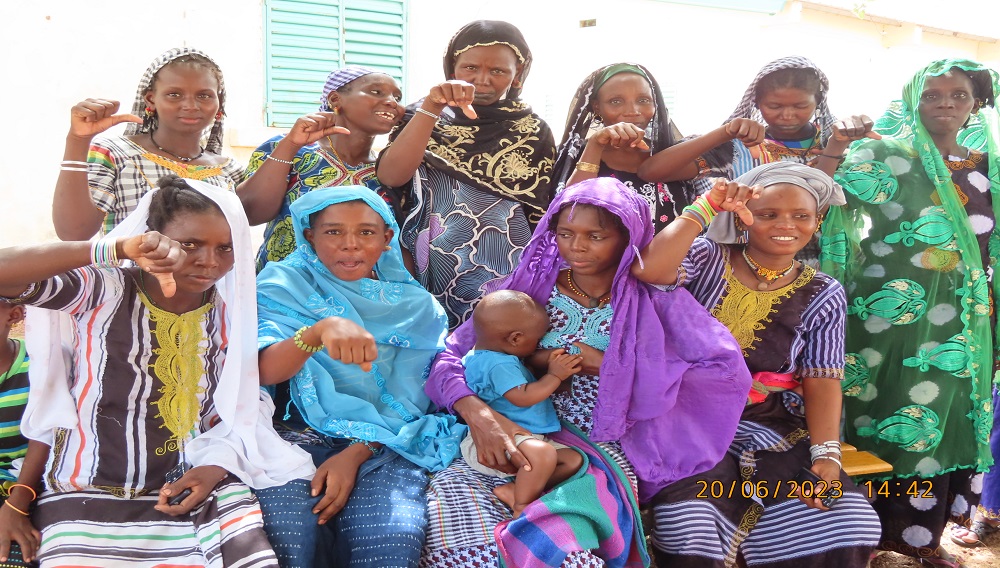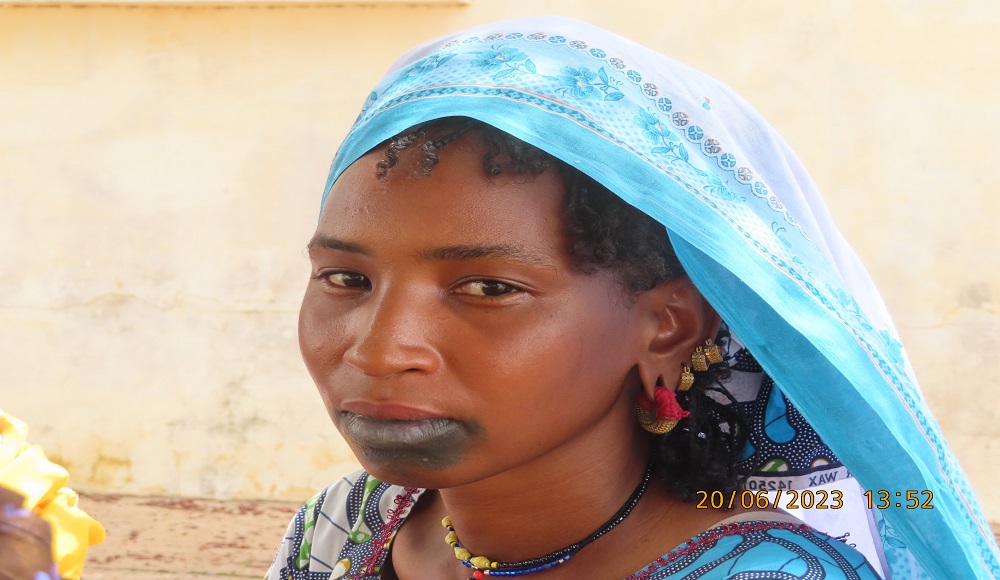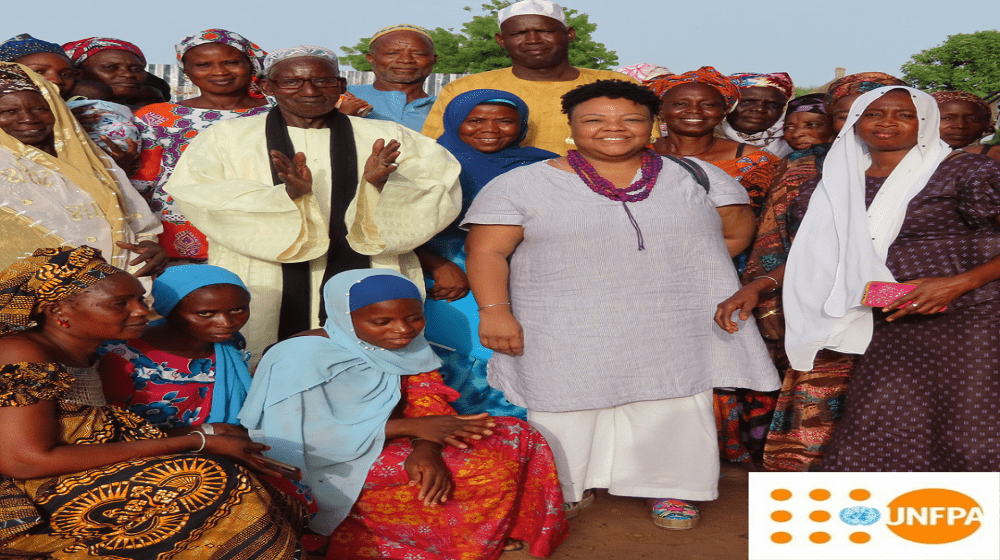After undergoing 6 free operations to treat her fistula, organised by UNFPA and Global Affairs Canada, AS, a mother in her forties living in the south of Senegal, has her life back.
Under the palaver tree in family homestead, deep in her village in the Tambacounda region, AS says: "I used to be very beautiful. But after giving birth, I contracted a fistula and my life was turned upside down. For almost 40 years, my faeces mixed with my urine, which was constantly leaking out. Because of the unpleasant odours emanating from my body, I lost friends and was no longer invited to christenings or other ceremonies.
Today, that's all in the past and she's living a full life once again.
Thanks to the project to improve the health and well-being of women and adolescents in the South (SDAFSS), AS has even been able to set up a small business and reintegrate into society.
Every day around the world, more than 800 women die from pregnancy-related complications. Among them, obstetric fistula is a scourge that undermines women's human dignity and exposes them to disabling conditions. It is linked to pregnancies, prolonged labour and difficult deliveries, with poor quality obstetric care provided on time.
UNFPA and AMC transformative initiatives from 2018 to 2023
From 2018 to 2023, UNFPA/ Global Affairs Canada mobilised nearly one hundred million CFA francs to provide surgical care for 210 women in Kolda and 114 in Sédhiou, organised hundreds of talks, and financed a reception centre and 3 guest rooms to accommodate the women. Each beneficiary is also monitored and given economic capacity-building.
The WHO defines obstetric fistula as an abnormal communication between the vaginal canal, the bladder and/or the rectum. Women suffering from fistula experience uncontrolled loss of urine or faeces, resulting in a permanent bad smell that stigmatises them. In addition to the social ostracism, according to the testimonies from the community talks, she faces violence against women such as marital abandonment, stigmatisation, family rejection, poverty, etc.
While obstetric fistula has been virtually eliminated in developed countries, it is clear that in Africa, women and girls still have to deal with this preventable and, in most cases, surgically repairable morbidity on a daily basis.
Established in Senegal in 1975, UNFPA is the United Nations agency working to reduce maternal mortality in order to accelerate progress in implementing the Programme of Action of the International Conference on Population and Development 5CIPD+25. In charge of reproductive health issues, the eradication of maternal mortality linked to pregnancy-related deaths is one of its most crucial objectives.
On 20 and 22 June 2023, UNFPA organised a field visit to communities supported by implementing NGOs to take part in two talks on obstetric fistula, as well as UNFPA's free interventions in the regions of Tambacounda and Kédougou, aimed at eradicating this pathology, which has serious medical, socio-economic and psychological consequences.

The UNFPA/AMC talks enable us to develop clear knowledge that will enable us to identify and report other female carriers for free surgery and care.
Breaking the silence through intergenerational dialogue in the village of Fass Gounass
In the village of Fass Gounass, talks organised by the non-governmental organisation (NGO) implementing partners of UNFPA/Global Affairs Canada have helped to free the voices of women living in rural areas. Thanks to these intergenerational women's meetings, the participants have learned to recognise and identify the signs of fistula, and are committed to referring cases in the future.
"I saw my neighbour regularly hanging out her washing outside her menstrual period. Because we know that our periods are naturally menstrual. What's more, a liquid was constantly dripping from her private parts, leaving stains wherever she sat. It smelt bad and she was ashamed. We neighbours could see it, but we didn't say anything. But the grandmothers said she was cursed. Then her husband abandoned her. We didn't see her any more. Now, from the chat we've had, I've just realised that she had fistula," says DD, a village resident.
A midwife, a member of the discussion group, explained to the participants that the problem of this severe and debilitating condition is linked to early marriages and pregnancies, home deliveries, and geographical, financial and/or inadequate access to health facilities. These considerable factors lead to delays in treatment at health facilities.
Obstetric fistula is one of the most serious injuries that women risk during childbirth. However, there is little data available on the epidemiology (incidence and prevalence) of obstetric fistula worldwide, especially in Senegal.
In Senegal, the government is responsible for taking the necessary steps to create a favourable and appropriate framework for improved collaboration with the sectoral ministries, in this case the Ministry of Health and Social Action and the Ministry of the Family and Early Childhood Protection, and the stakeholders in order to develop synergies adapted to the integrated care of women for the elimination of obstetric fistula.
UNFPA/AMC collaboration to eradicate obstetric fistula in all regions of Senegal
With the United Nations Population Fund (UNFPA) and the World Health Organization (WHO), considerable efforts have been made through the national platform on obstetric fistula, which brings together NGOs and other national and international partners to raise awareness, mobilise resources and perform surgical repairs on women in the most remote areas of Senegal's 14 regions.
In terms of the global strategy to guarantee universal access to quality sexual and reproductive health and rights, by 2022 the signatory states of the convention on obstetric fistula have committed to developing and implementing an inclusive, integrated, costed and time-bound national strategy and action plan to put an end to obstetric fistula within the next 7 years (ODD2030). The obstetric fistula prevention component includes monitoring family planning to avoid avoidable pregnancies, the fight against child marriage and early pregnancy among adolescents (still immature pelvis), antenatal consultation (at least 4 consultations), delivery assisted by qualified personnel in an equipped maternity hospital (not at home) and emergency neonatal obstetric care, including timely caesarean section.
The obstetric fistula management component includes community-based identification of women with obstetric fistula, confirmation of the case by medical examination in a medical facility, grouping of women confirmed as having obstetric fistula in a centre, organisation of a free surgical repair campaign for these women, physiological (urinary physiotherapy) and psychological post-operative re-education of these operated women, and then socio-economic reintegration through income-generating activities.

I pledge to put an end to obstetric fistula in UNFPA's zones of intervention.
.


